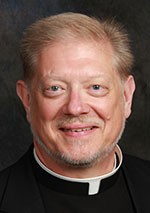That All May Be One / Fr. Rick Ginther
Pope’s new encyclical has universal religious application
 Pope Francis latest encyclical “Fratelli Tutti: On Fraternity and Social Friendship,” was promulgated on Oct. 3—the eve of the feast of St. Francis of Assisi.
Pope Francis latest encyclical “Fratelli Tutti: On Fraternity and Social Friendship,” was promulgated on Oct. 3—the eve of the feast of St. Francis of Assisi.
Addressed to the bishops of the world, it is a document with universal religious application.
Our worldwide experience of COVID-19,
Francis notes, elicits “fraternal love” as proclaimed by Jesus Christ (#2).
The pope encourages the world—Christians and those of all religions—to be reborn into a universal spirit of “fraternity and social friendship” (#2).
The parable of the Good Samaritan—the one who acted as neighbor to a Jew left in a ditch to suffer or die—is the scriptural root. Compassion dissolves political and religious differences. The neighbor incorporates another, the innkeeper, to reach out in fraternal love.
A summary of the encyclical can be found at cutt.ly/FratelliTuttiSummary.
“Religions at the Service of Fraternity in our World” (chapter eight) concludes the pope’s urgings.
“The different religions, based on their respect for each human person as a creature called to be a child of God, contribute significantly to building fraternity and defending justice in society,” he writes (#271).
“[T]he goal of dialogue [among religions] is to establish friendship, peace and harmony, and to share spiritual and moral values and experiences in a spirit of truth and love” (#271).
“As believers, we are convinced that, without an openness to the Father of all, there will be no solid and stable reasons for an appeal to fraternity,” the pope continues (#272).
“From our faith experience and from the wisdom accumulated over centuries, but also from lessons learned from our many weaknesses and failures, we, the believers of different religions, know that our witness to God benefits our societies. The effort to seek God with a sincere heart, provided it is never sullied by ideological or self-serving aims, helps us recognize one another as travelling companions, truly brothers and sisters” (#274).
“It should be acknowledged that ‘among the most important causes of the crises of the modern world are a desensitized human conscience, a distancing from religious values and the prevailing individualism accompanied by materialistic philosophies that deify the human person and introduce worldly and material values in place of supreme and transcendental principles,’ ” the pope notes (#275).
The Holy Father continues, noting that it is the role of the Church (and by inference, all Christians and other religions) to “ ‘reawaken the spiritual energy’ that can contribute to the betterment of society” (#276).
Echoing the esteem the Church has for how God works in other religions, the pope notes: “She has a high regard for other religions’ manner of life and conduct, their precepts and doctrines which … often reflect a ray of that truth which enlightens all men and women” (#277).
Pope Francis offers a sweeping metaphorical statement about all Christian believers: “We Christians are very much aware that ‘if the music of the Gospel ceases to resonate in our very being, we will lose the joy born of compassion, the tender love born of trust, the capacity for reconciliation that has its source in our knowledge that we have been forgiven and sent forth. If the music of the Gospel ceases to sound in our homes, our public squares, our workplaces, our political and financial life, then we will no longer hear the strains that challenge us to defend the dignity of every man and woman’ ” (#277).
“That all may be one” was the Lord’s mandate to the early Church (Jn 17:21). Twenty-one centuries later, it is a parallel mandate for all humanity.
(Father Rick Ginther is director of the archdiocesan Office of Ecumenism and Interreligious Affairs. He is also the pastor of Our Lady of Lourdes Parish, Indianapolis.) †
 Pope Francis latest encyclical “Fratelli Tutti: On Fraternity and Social Friendship,” was promulgated on Oct. 3—the eve of the feast of St. Francis of Assisi.
Pope Francis latest encyclical “Fratelli Tutti: On Fraternity and Social Friendship,” was promulgated on Oct. 3—the eve of the feast of St. Francis of Assisi.